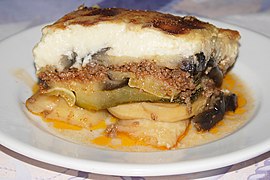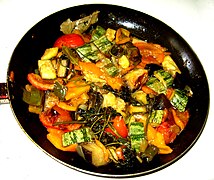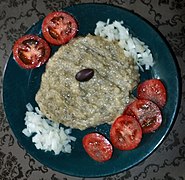Description
🚚 The fastest delivery time : 2-day delivery.
🐝 Supplier / Origin : Our partner at Yunnan Organic Planting Base
🔖 Certification : IFOAM / Canada / China Organic Certified
🌱 Producer introduction : Organic certification by China and Canada; in 2016, all pesticide residues in a random inspection by the Consumer Council were zero.
Dianyuan Fengzhigu Reserve, Panlong District, Yunnan
Yunnan has a unique climate, and the four seasons are like spring. The varieties are selected from local pests and viruses that are resistant to viruses and easy to grow. Therefore, different from the local organic breeding in Hong Kong, the quality is plump and firm.
Harvest season in Hong Kong : From December to March, farms generally do not have harvests on other days. When there are harvests in Hong Kong, we will provide local organic products, giving consumers a natural choice!
Refer to our supplier introduction:
https://www.healthyexpress.hk/pages/yunnan-kunming-organic-vegetables
Yunnan Kunming Organic Vegetable Farm is located in the Dianyuan Wind Valley Reserve, Panlong District, Kunming City, Yunnan Province, where the soil is fertile and the water source is clean; the environmental management requirements in the area are strict. Taking into account the ecological environment and economic development, the farm strictly abides by organic standards and has no agricultural pollution. The organic vegetables grown in the reserve are particularly sweet and delicious.
The unique climate of Yunnan
Yunnan has a good climate and plenty of sunshine. The average temperature is 14.9°C, the highest temperature is 31.5°C, and the lowest temperature is -7.8°C; the rainy season is mainly concentrated in May to September; the relative humidity is 76%. The altitude of the plateau in Panlong District is about 1891m, which gradually decreases from north to south in a step-like manner. The altitude between 1500 and 2800m is most suitable for planting diversified vegetables.
Get double certification
Because the certification standards in China and Hong Kong are different and uneven. In view of this, Mr. Feng, who attaches great importance to personal integrity and integrity, hopes to gain the recognition and trust of consumers. Organic vegetables in Kunming, Yunnan have obtained double certification: domestic organic certification and Canadian organic certification.
In 2016, all the pesticide residues in the Consumer Council's random inspection were zero; after many years of random inspection by our customers, there was no residual pesticide.
🌾 Harvesting : All seasons around
🛍 Product Information :
Eating
There are many ways to eat it, including stir-frying, roasting, frying, steaming, mixing, and sautéing. Eggplant is rich in flavonoids, and the content is even richer where the skin and the flesh are connected. The eggplant skin contains a variety of compounds that are beneficial to human health, so it is not recommended to peel it when cooking. Asia, Europe and Africa all have different eggplant dishes. Traditional Chinese dishes include eggplant boxes, eggplant with mashed garlic, stir-fried eggplant with sauce, eggplant with meat slices, braised sweet and sour eggplant, eggplant with fish flavor, eggplant cakes with pepper and salt, braised eggplant, etc. Local dishes include fried eggplant shreds from Beijing, eggplant wrapped in sauce from Shanxi, strange-flavored eggplant from Hunan, eggplant casserole and fried stuffed eggplant from Guangdong. In the Mediterranean regions such as Spain, Italy, Greece, Morocco, etc., roasted eggplant with olive oil is popular.
East Asia
Korean and Japanese eggplant varieties are typically thin-skinned.
In Chinese cuisine, eggplants are known as qiézi (茄子). They are often deep fried and made into dishes such as yúxiāng-qiézi ("fish fragrance eggplant")[50] or di sān xiān ("three earthen treasures"). Elsewhere in China, such as in Yunnan cuisine (in particular the cuisine of the Dai people) they are barbecued or roasted, then split and either eaten directly with garlic, chilli, oil and coriander, or the flesh is removed and pounded to a mash (typically with a wooden pestle and mortar) before being eaten with rice or other dishes.
In Japanese cuisine, eggplants are known as nasu or nasubi and use the same characters as Chinese (茄子). An example of it use is in the dish hasamiyaki (挟み焼き) in which slices of eggplant are grilled and filled with a meat stuffing.[51] Eggplants also feature in several Japanese expression and proverbs, such as "Don't feed autumn eggplant to your wife" (秋茄子は嫁に食わすな, akinasu wa yome ni kuwasuna) (because their lack of seeds will reduce her fertility) and "Always listen to your parents" (親の意見と茄子の花は千に一つも無駄はない, oya no iken to nasu no hana wa sen ni hitotsu mo muda wa nai, literally: "not even one in a thousand of one's parents' opinions or the eggplant flowers is in vain").[52][53]
In Korean cuisine, eggplants are known as gaji (가지). They are steamed, stir-fried, or pan-fried and eaten as banchan (side dishes), such as namul, bokkeum, and jeon.
-
Chinese
yúxiāng-qiézi (fish-fragrance eggplants)
-
Korean
dureup-gaji-
jeon (pan-fried eggplants and angelica tree shoots)
-
Japanese
asazuke pickles with baby eggplants
Middle East and the Mediterranean
Eggplant is often stewed, as in the French ratatouille, or deep-fried as in the Italian parmigiana di melanzane, the Turkish karnıyarık, or Turkish, Greek, and Levantine musakka/moussaka, and Middle Eastern and South Asian dishes. Eggplants can also be battered before deep-frying and served with a sauce made of tahini and tamarind. In Iranian cuisine, it is blended with whey as kashk e bademjan, tomatoes as mirza ghassemi, or made into stew as khoresht-e-bademjan. It can be sliced and deep-fried, then served with plain yogurt (optionally topped with a tomato and garlic sauce), such as in the Turkish dish patlıcan kızartması (meaning fried aubergines), or without yogurt, as in patlıcan şakşuka. Perhaps the best-known Turkish eggplant dishes are imam bayıldı (vegetarian) and karnıyarık (with minced meat).
It may also be roasted in its skin until charred, so the pulp can be removed and blended with other ingredients, such as lemon, tahini, and garlic, as in the Levantine baba ghanoush, Greek melitzanosalata, Moroccan zaalouk and Romanian salată de vinete. A mix of roasted eggplant, roasted red peppers, chopped onions, tomatoes, mushrooms, carrots, celery, and spices is called zacuscă in Romania, and ajvar or pinjur in the Balkans.
A Spanish dish called escalivada in Catalonia calls for strips of roasted aubergine, sweet pepper, onion, and tomato. In Andalusia, eggplant is mostly cooked thinly sliced, deep-fried in olive oil and served hot with honey (berenjenas a la Cordobesa). In the La Mancha region of central Spain, a small eggplant is pickled in vinegar, paprika, olive oil, and red peppers. The result is berenjena of Almagro, Ciudad Real. A Levantine specialty is makdous, another pickling of eggplants, stuffed with red peppers and walnuts in olive oil. Eggplant can be hollowed out and stuffed with meat, rice, or other fillings, and then baked. In Georgia, for example, it is fried and stuffed with walnut paste to make nigvziani badrijani.
In medieval Spain, eggplant, along with ingredients such as Swiss chard and chickpeas, was closely associated with Jewish cuisine. The Kitāb al-Ṭabikh, a 13th-century Andalusian cookbook, features eggplant as the main ingredient in fifteen out of its nineteen vegetable dishes, indicating its significance in the local cuisine at the time. Jewish communities in Spain prepared eggplant in various ways, including in dishes like almodrote, a casserole of eggplant and cheese. This dish and others became identifiers for Jews during their expulsion from Spain and the Inquisition, and they were carried by the expelled Jews to their new homes in the Ottoman Empire. The classic Judaeo-Spanish song "Siete modos de gizar la berendgena" lists various methods of preparing eggplant that persisted among Jews in the Ottoman Empire. Today, eggplant remains a defining ingredient of Sephardic Jewish cuisine.
☘️ Preserve vegetables
1. Leafy vegetables and softer vegetables, if packaged, should be placed in the cold box in the original package;
2. Vegetables bought in bulk are more prone to spoilage if they have water droplets. Put the vegetables in a ventilated place to dry or wipe off the water vapor, then wrap the vegetables in slightly damp newspaper and put them in a plastic bag before refrigerating. ;
3. The longer the vegetables are stored, the less fresh they become, and the nutrition will be reduced, so they should be eaten as soon as possible.
☘️ How to wash vegetables
1. Wash vegetables before cooking to keep them fresh;
2. It is not advisable to soak the vegetables for too long, and they should be washed first and then cut to avoid the loss of vitamins;
3. Washing vegetables with dilute salt water or Dish Drop can easily remove vegetable insects;
4. Cut vegetables with a stainless steel knife to reduce vitamin loss;
5. Vegetable leaves contain a lot of nutrients, so you should avoid shredding, chopping or grinding the leaves;
6. Immediately after cutting, the pot should be placed in the pot to avoid the loss of vitamins due to air oxidation.




















